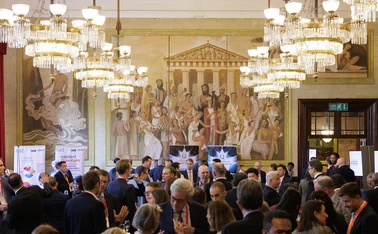
Asset manager of the year: BlackRock
BlackRock delivered innovative new products and highly regarded training scheme

The past year has been a relatively placid one for financial markets, amid global macroeconomic strength and a smooth reversing of ultra-loose monetary policy by the US Federal Reserve Board. Nevertheless, the environment remains a challenging one for reserve managers, who have had to strike a delicate balance between controlling risk in their portfolios and seeking out yields high enough to prevent the erosion of their capital.
The winner of this year’s award for asset management, BlackRock, combines a solid foundation of traditional reserve management services with the innovation needed to seek out elusive yields. The firm’s strengths are rounded off by a training programme that receives high praise from central bank users.
With $412 billion under management in its official sector business as of January 1, 2018, including central banks, sovereign wealth funds and others, BlackRock manages a significant chunk of the world’s reserve assets. The firm’s mandates from official sector clients span a very wide range of asset classes, from government debt and indexed equities to exchange-traded funds (ETFs) and less traditional products, including factor strategies and unconstrained fixed income. BlackRock’s ETF franchise now represents over $1.7 trillion in assets, as part of the firm’s $6.3 trillion total assets under management.
The Bank of Israel is one long-term client. Francoise Ben-Zur, deputy head of the central bank’s market operations department, says the central bank has tended to invest directly in securities, rather than via ETFs, with BlackRock acting as external manager for the parts of the portfolio devoted to equities and corporates.

BlackRock’s offering extends well beyond its management services, and central bank clients are particularly appreciative of its analytical work. Ben-Zur praises BlackRock’s research support: “The feedback we receive is very professional, and they are willing to do analysis upon our requests, even if it is not related directly to the mandates they manage for us.”
A few years ago, BlackRock helped the Bank of Israel develop the methodology for its strategic asset allocation. “Now we have our own methodology, they still independently do a very thorough strategic asset allocation for us each year, and we take it into account in our decision process,” says Ben-Zur.
Now we have our own methodology, [BlackRock] still independently do a very thorough strategic asset allocation for us each year, and we take it into account in our decision process
Francoise Ben-Zur, Bank of Israel
Training regime
BlackRock’s commitment to improving its clients’ outcomes also extends to a more formal training programme. “We have made a big commitment to knowledge transfer,” says Terrence Keeley, head of the firm’s official institutions group. “One of the responsibilities that has been given to our group is not only external education, but also internal development and training at BlackRock. We believe that both our clients and our own professionals should benefit from the tutelage, resources and class work we are offering.”
We have made a big commitment to knowledge transfer. One of the responsibilities that has been given to our group is not only external education, but also internal development and training at BlackRock
Terrence Keeley, BlackRock
The Bank of Lithuania has had a relationship with BlackRock for several years now, both as a user of the firm’s ETF services and a participant in training sessions. Romualdas Zovė, head of the central bank’s asset allocation division, says the teaching programme for central banks is “very useful”. “I was able to obtain quite a significant breadth of knowledge. This allowed us to choose better investment solutions,” he says. “When you have breadth of knowledge, you can always seek out more detail yourself – you know where to look.”
The central bank’s reserve managers are now considering their next move. “As the country’s biggest asset manager, the Bank of Lithuania is looking for innovative ways to add yield,” says Zovė. “We are planning in the long term to expand the scope of active investment strategies by introducing external asset managers to increase diversification and returns of our reserve portfolio.”
Hunting for yield
Central banks are notoriously conservative institutions, but the paradoxical need to move into riskier areas to protect the value of their reserves is forcing many to think more laterally about their investments. BlackRock says a handful of central banks have signed up in the past year for two of its more innovative products: an unconstrained fixed-income fund; and a multi-asset fund that seeks to balance its exposures across a set of risk factors.

The unconstrained fund takes advantage of its lack of a benchmark to invest widely, across the entire bond market and a few additional assets deemed to be uncorrelated, without constraints due to sector, quality or geography. “The volatility in those portfolios is so low, and the returns so stable, it shows central banks it is possible to create a stable portfolio using traditional asset classes and sophisticated risk management,” says Keeley. Two central banks have invested in the strategy, although they declined to speak on the record about their experience because the investment mandates are still very new.
The second area, the multi-asset fund, seeks to capture the main factors driving return, including elements related to economic growth, credit to corporates, emerging markets, liquidity risk, real rates and inflation. Clients speak highly of BlackRock’s Andrew Ang, head of factor investing and a former professor at Columbia Business School, who masterminded the approach.
One major sovereign wealth fund that has worked with BlackRock for several years recently chose to invest in the multi-asset fund, allocating between $500 million and $1 billion. A manager with the sovereign wealth fund praises BlackRock’s approach to factor investing, saying he believes it is the “right direction” given the low-yield environment. He notes that while the idea of factor investing has been around for a while, BlackRock has been one of the first major asset managers to put it into practice. The fund manager describes the fund’s performance so far as “above average”.
Overall, 2017 has been a successful year for BlackRock’s official institutions group, as it maintained a solid core of reserve management services while pushing into new areas. Time will give the full measure of how these new approaches fare – but the firm’s adaptability, despite its massive size, is a strong point in its favour. Coupled with its solid training programmes, BlackRock’s offering is an important asset to the central banking community.
The Central Banking Awards were written by Christopher Jeffery, Daniel Hinge, Dan Hardie, Rachael King, Victor Mendez-Barreira, Iris Yeung, Joel Clark and Tristan Carlyle
Only users who have a paid subscription or are part of a corporate subscription are able to print or copy content.
To access these options, along with all other subscription benefits, please contact info@centralbanking.com or view our subscription options here: www.centralbanking.com/subscriptions
You are currently unable to print this content. Please contact info@centralbanking.com to find out more.
You are currently unable to copy this content. Please contact info@centralbanking.com to find out more.
Copyright Infopro Digital Limited. All rights reserved.
As outlined in our terms and conditions, https://www.infopro-digital.com/terms-and-conditions/subscriptions/ (point 2.4), printing is limited to a single copy.
If you would like to purchase additional rights please email info@centralbanking.com
Copyright Infopro Digital Limited. All rights reserved.
You may share this content using our article tools. As outlined in our terms and conditions, https://www.infopro-digital.com/terms-and-conditions/subscriptions/ (clause 2.4), an Authorised User may only make one copy of the materials for their own personal use. You must also comply with the restrictions in clause 2.5.
If you would like to purchase additional rights please email info@centralbanking.com




